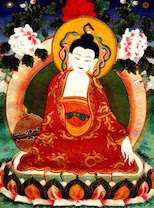Koso Wasan 8
The Commentary on the Mahaprajnaparamita Sutra states:
The Tathagata is the supreme dharma-king;
With bodhisattvas a dharma-vassals,
The person to be deeply revered is the World-Honoured One.
The Supreme King

Now Shinran leaps across the centuries to the writings of Tao-cho, who lived some three hundred years after Nagarjuna, so that he can explore the importance of Amida Tathagata in more detail. For, we can be sure, the Tathagata here being described as 'Supreme King of the Dharma', is - from the context - Amida. Shinran draws on Tao-cho's Anrakushu right up until his last verse on Tao-cho himself. It seems to me that it was Tao-cho who really developed a sense of tradition in relation to the Pure Land way and in doing so he had reason to allude to his antecedents. We shall explore this more fully when we come to discuss the verses on Tao-cho.
Readers will remember our discussions about the Buddhist god Yama, who is widely described as the King of the Dharma because he embodies the inexorable law of karma to which the Buddha Dharma responds, while yet remaining integral to it. The 'way out of samsara', which the Buddha Dharma proposes, works within the law of karma in order to transcend it.
I always love to place this and the next two verses in juxtaposition with the verses in the Jodo Wasan, which deal with Yama the King of the Dharma, because of the sheer and heady power that is manifest in the relativities implied by the titles. On one hand, there is the 'King of the Dharma' for Yama, and, on the other, is the 'Supreme King of the Dharma' for Amida Tathagata. The law of karma is inexorable and cannot be mitigated or appeased. The Supreme King, Amida Buddha entered this most inesacapable law - he became Bhiksu Dharmakara, found enlightenment, attained parinirvana, transcended, and re-entered samsara... all within the frame of the law of karma!
Another thing that this verse sets me thinking about is the question of just what is meant by the term 'King'. Remember that just one or two hundred years after Nagarjuna, the same Indian subcontinent that gave birth to him, gave birth to the game of chess. In it we have a kind of kingship which is rather unfamiliar to those of us who have come up within the European tradition. My understanding is that kingship in the European context began in the Mediterranean as a sacral role - in which the King was often murdered in fertility rituals - and developed into the tryannical and feudal model of kingship that died in England with King Charles I and, more generally, with the Revolution in France and the Long March in China.
The King in the game of chess is, like all the pieces on the chessboard, bound by the law of karma. The station, or 'natural' state of each piece is bound by inexorable and restrictive laws. In this sense, the chess-board itself is Yama, the King of the Dharma. The entire cohort of pieces on the chess-board, however, is motivated by the need to keep their king free, in both defensive and offensive moves. In other words the 'inner reality' of the game is the King - it is the King which lies at the heart of everything. Kingship in India, is marked by the certainty that the law of karma binds and determines both the nature and fortune of the King; yet this is not so much the case in the west or the far east.
The King of the Dharma (Yama) and the Supreme King of the Dharma (Tathagata) are not at odds with each other; they work within the same natural constraints. Yet the implicit motivation within these contraints is ultimately that of the Supreme King, who does not so much direct events as motivates them - towards freedom and transcendence. This implicit motivation is the Primal Vow, which is rendered explicit in the forty-eight Vows of Amida Buddha and the Namo Amida Butsu that calls within our hearts.